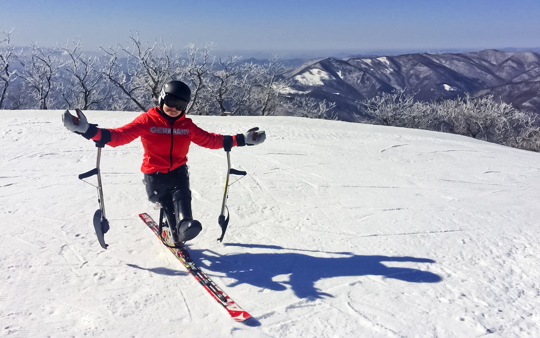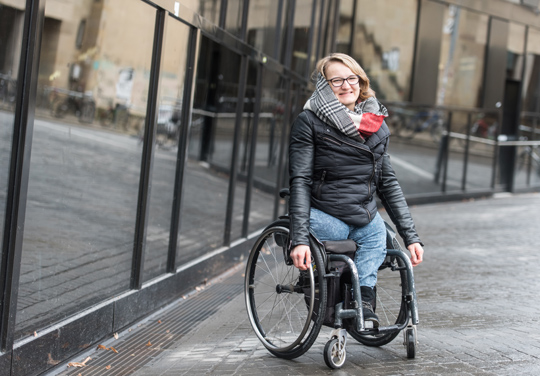Gold for Anna-Lena Forster
Freiburg, Mar 13, 2018
The Radolfzell native and psychology student Anna-Lena Forster won two gold medals at the Paralympics in Pyeongchang, South Korea. The 22-year-old entered the monoski competition. Since her World Cup debut five years ago, she has already won eleven World Cup victories, three Paralympic medals and four world championship medals. In an interview with Alexander Ochs, the athlete revealed her everyday life abroad even before her current win.
 Greetings from Pyeongchang: Anna-Lena Forster will compete in monoski.
Greetings from Pyeongchang: Anna-Lena Forster will compete in monoski.
Photo: Anna-Lena Forster
Ms. Forster, you arrived in South Korea on March 5, 2018. How have you been doing since then?
Anna-Lena-Forster: Really well. At the airport there was no sign of the Paralympics. But in the Paralympic Village you have people from every nation and type of sports around you. It feels great.
 Anna-Lena Forster knows how to utilize her time between competitions: That's when she studies in the University Library Freiburg for her psychology degree.
Anna-Lena Forster knows how to utilize her time between competitions: That's when she studies in the University Library Freiburg for her psychology degree.
Photo: Patrick Seeger
What does daily life look like for you in Pyeongchang?
On training days we have to get up at shortly before 5 am. Then we have to ride about an hour by bus to the ski area. By 7:30 am we get to view the run and at 9:30 am we can begin our downhill training. At 1pm we return from the slopes. On competition days it is later, of course, and then we have the flower ceremony. Then we have to wait for our colleagues and then go to the Alpine house in the evening. That’s what the German house is called now. There I get to meet up with my parents and other athletes. And then we try to get to bed by 11 pm at the latest.
Who is with you on site?
The same team with which I always do World Cup races or the World Championships: five girls and two guys. We have been training together for a long time. We are a well-rehearsed team. We all get along really well and laugh a lot together, which gives you a certain routine and sense of security. Besides, my parents have come and will stay until the very last day of competition.
How have the training and competition conditions been for you?
They were super the first day. We had great weather and the slope was hard and firm without being icy. I had a good feeling about it. But then there was new snow overnight so that the slopes first had to be groomed, which is why training was canceled. The weather is rather unpredictable. It is relatively warm such that it is just above or at the freezing point, but rarely beneath it.
When is it your turn to compete?
I am starting in all five downhill disciplines. I have already had competitions on March 10 and 11. There are three more until March 18, which is the end of the Paralympics. We will celebrate the closing ceremony on March 18. It such a shame that we don’t have time to experience and absorb more of our surroundings.
How have you experienced the people in South Korea?
The people don’t speak English very well. But some, such as the volunteers, speak German. That totally surprised me. I haven’t seen much of the country, but I have had a good impression in any case. We are closed off in the Paralympic Village. But I was here in 2017 for the World Cup. It was a test event for the Paralympics. This is my second time here.
What has been your greatest challenge thus far?
I can’t say that I’ve had any. Last year we had some trouble with doping control. The person barely spoke any English at all. And they said we should wait for doping control until after the medal ceremony and not to go to the bathroom. But we couldn’t do that. It was simply too difficult to make ourselves clear. The next time there was always someone there who spoke English. What is also a shame is the driving time from the Paralympic Village to the ski area. We waste two hours per day alone getting there and back, time we could have used to have a look around the area.
What are your chances here?
What I would like to achieve in general is the ability to tap into my training performance. If I do, I should do quite well. In any case, I am aiming for gold in the slalom!
Five Alpine sport disciplines
Anna-Lena Forster was born in 1995 with a shortened left leg and no right leg. At the age of six, she took a ski course in the winter of 2001/2002 in Kaunertal. She has mastered the five alpine para-ski sport disciplines slalom, giant slalom, downhill, super-G and super-combination with a so-called wheelchair monoski and has already won many trophies. Forster studies psychology at the University of Freiburg.
Anna-Lena Forsters Homepage

